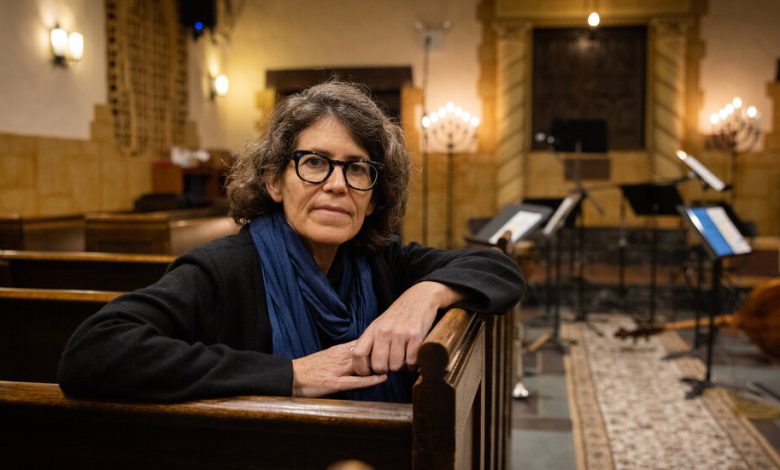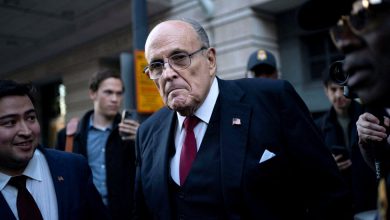Netanyahu’s Comeback Widens Divide Over Israel Among American Jews

Rabbi Rachel Timoner of Brooklyn had always cherished Israel as a haven where Jews could aspire to their highest ideals. But after Benjamin Netanyahu won a sixth term as prime minister with the help of two far-right parties this month, she was shaken.
The Israeli elections “have brought in the most racist and farthest-right leadership Israel has ever seen,” Rabbi Timoner told worshipers at a recent Shabbat service at Congregation Beth Elohim in Park Slope. “Periodically, a kind of authoritarian, nationalist, fascist insanity grips many countries in the world simultaneously,” she added, linking the Israeli election results to far-right politics in the United States, Italy and Hungary.
Not long ago, it might have been a shock for a pulpit rabbi in a fashionable Brooklyn neighborhood to speak so strongly against Israel’s leaders. But with Mr. Netanyahu’s return, a sense of unease toward Israel’s government has grown among many American Jews.
Some American Jews welcomed the victory by Mr. Netanyahu and his coalition partners — especially conservatives, a growing political bloc, and the Orthodox, the fastest-growing segment of the American Jewish population.
Liel Leibovitz and Tony Badran, writing in Tablet, a right-leaning Jewish magazine, dismissed the concerns of liberal Jews as “squawking about the end of democracy and the brink of war” in an essay after the results were announced. Using a nickname for Mr. Netanyahu, they wrote: “Bibi remains the only adult in the room.”
The Orthodox Union, the biggest umbrella organization of Orthodox Jewish groups in the United States, released a statement congratulating Mr. Netanyahu and urging “the international community, as well as those across the global Jewish community,” to do the same.
For more progressive Jews, that is not a simple request. For many, including followers of the Reform and Conservative movements, the sense of discomfort with Israel’s direction has perhaps never been more keenly felt than since the victory of Mr. Netanyahu, who is on trial for corruption and could face several years in prison.
Mr. Netanyahu has governed Israel longer than any other leader, and his victory was not a shock to Israeli pundits. The source of deepest alarm for some in Israel, and many in the United States, has been his partnership with the Religious Zionism Party, led by Bezalel Smotrich, and with Jewish Power, led by Itamar Ben-Gvir.
Mr. Netanyahu has always been a right-leaning leader. But in his earlier terms as prime minister, he almost always governed in coalition with centrist parties that limited how far right his government could be.
Mr. Netanyahu’s far-right partners now both have a history of hostility toward Israel’s Arab minority, which makes up roughly one-fifth of its population.
The eventual goal of Mr. Smotrich is to impose Israeli sovereignty over the West Bank and for Israel to be governed by the laws of the Torah.
In its platform, the ultranationalist Jewish Power calls for disbanding the Palestinian Authority, annexing the West Bank and expelling those “disloyal to Israel.”
Mr. Ben-Gvir has also been a source of alarm. He has expressed admiration for Meir Kahane, a politician who called for expelling Israel’s Arab citizens and banning sex between Jews and non-Jews, as well as for Baruch Goldstein, a West Bank settler who killed 29 Palestinians and wounded 125 more when he attacked a mosque in 1994. More recently, Mr. Ben-Gvir has called for a law barring converts to non-Orthodox Judaism from claiming Israeli citizenship. Reform and Conservative religious groups denounced the proposal.
Israel held its fifth election since 2019 on Nov. 1. Mr. Netanyahu completed his comeback and won office only a year after being driven from the prime minister post, pursued by charges of bribery, fraud and breach of trust. His alliance captured 64 seats, giving him a clear majority in the 120-seat Parliament. On Nov. 13, Israel’s president, Isaac Herzog, invited Mr. Netanyahu to begin the weekslong process of forming a government.
At B’nai Jeshurun, a synagogue on the Upper West Side, Rabbi Rolando Matalon also used a recent sermon to express dismay at the election results. He told worshipers that Jewish Power was a “racist, Jewish-supremacist” party that promoted “hateful and violent ideas.”
“My most dominant emotion is fear,” said Rabbi Matalon in an interview. “I’m afraid about the erosion of what was a liberal democracy, democratic values, of the judicial system.”
Mr. Netanyahu has denied all the criminal charges against him, and has said he will not interfere with the ongoing corruption trial. But some of his coalition partners have expressed support for forcing the judiciary to end the trial entirely.
Affection for Israel is widespread among American Jews. Roughly 80 percent said Israel is an essential or important part of what being Jewish means to them, and roughly 60 percent said they felt an emotional attachment to it, according to a Pew Research Center study published last year. But fewer than half of American Jews held positive feelings for Mr. Netanyahu, according to Pew.
Others, especially younger Jews, may not feel much connection with Israel at all. The Pew study found 27 percent of American Jews between the ages of 18 and 29 said Israel was not an important part of what being Jewish meant to them, a view shared by only 8 percent of those over 65. Fifty-one percent said they felt little or no connection with Israel.
That sense of anguish over Israel was evident at Shabbat services on a recent Friday night at Congregation Beth Elohim, one of the largest Reform synagogues in Brooklyn.
Irvin Schonfeld, 75, bristled at the mention of Mr. Netanyahu, whom he accused of interfering in the 2016 elections by criticizing the Obama administration.
“I do not like these far right parties because there is an element of racism in them,” Mr. Schonfeld said. “I feel very strongly that there is no place for that in politics.”
For Rachel Sternlicht, 27, the ambivalence runs deeper. “I don’t feel like I have a claim to that land and that space,” she said. “I feel like the Palestinians have more of a claim to that land than I do, but they cannot move as freely as I could when I was there.”
Those feelings deepened last year after a visit to Israel, she said. She expected to feel connected to Israel, but instead came away feeling more alienated from it. “I had never felt more American in my life,” Ms. Sternlicht said. “I think Israel should exist, but I genuinely think as it currently stands there are enormous, vast inequities and I find them morally repugnant.”
Jewish groups in the United States have been divided in their response to Mr. Netanyahu’s re-election. Many, including the American Israel Public Affairs Committee and the Jewish Federations of North America, took a muted approach, celebrating Israel’s democracy or congratulating him on his victory.
Others have expressed concern. The Union for Reform Judaism said in a statement that including Mr. Ben-Gvir and Mr. Smotrich in the government would “be painful for Jews worldwide who will not see the Israel they love and believe in reflected in these leaders, nor in the policies they pursue.”
The Anti-Defamation League said it was “greatly concerned” about the results and warned that Mr. Netanyahu’s coalition partners “have a long history of engaging in racist, anti-Arab, homophobic and other hateful behavior.”
It said including them in the next Israeli government would “impact its standing, even among its strongest supporters.”
But some who view themselves as fierce backers of Israel have been pleased with the results.
Rabbi Pesach Lerner, an Orthodox leader in Queens and the chairman of the Eretz HaKodesh party in the World Zionist Organization, said many in his community saw a vote for Netanyahu as a vote for religious freedom and public safety. He balked at the idea that Mr. Ben-Gvir might be racist against Arabs.
“Yes, he wants to round up people who he believes don’t belong here,” Rabbi Lerner said. “He doesn’t say every Arab. He says the Arabs who hate Israel, who are out to destroy Israel, who are associated with terrorists — they don’t belong here. If you follow the rules, welcome.”
Others agree the anxiety over Mr. Netanyahu is overblown.
Nathan J. Diament, the executive director for the Orthodox Union Advocacy Center, said Mr. Netanyahu’s election was first and foremost a victory for democracy at a time when many Western democracies seem under threat.
He said it was premature to worry about Mr. Netanyahu’s coalition partners or potential policies. At any rate, he said, “the electorate knows what they voted for.”
Anne Barnard and Patrick Kingsley contributed reporting.
.




